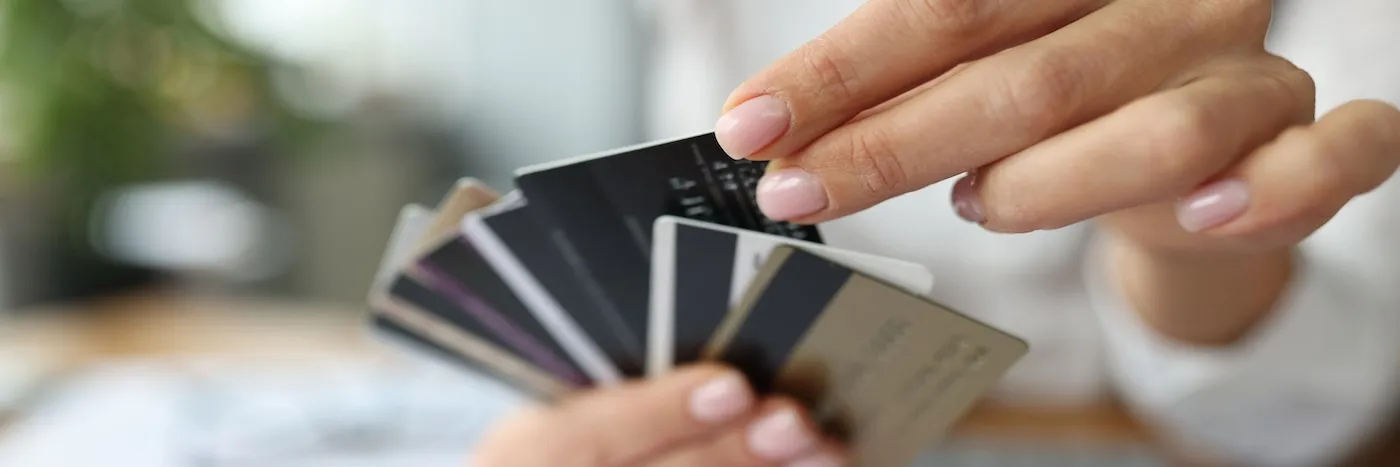How Many Credit Cards Should I Have?
Quick Answer
The amount of credit cards you should have depends on your financial situation and needs, but you should have at least one credit card.

Having multiple credit cards can benefit your finances as long as you manage them responsibly. However, there's no simple answer for the ideal number of cards to have in your wallet.
While using at least one credit card can help you build a good credit history and have other benefits, consider your financial situation, habits and preferences to determine whether you should apply for more.
How Many Credit Cards You Should Have
Most credit experts and financial advisors recommend a minimum of one credit card, especially if you're working on building or rebuilding your credit history. Responsible credit card habits, including maintaining a low credit utilization rate and paying your bill on time every month, help contribute positively to the most influential factors in your FICO® ScoreΘ. Maintaining a good mix of different credit accounts can also be beneficial.
Adding more credit cards to your wallet can further benefit your credit by increasing your available credit. Showing that you can manage multiple accounts responsibly can also help. What's more, using multiple credit cards can also make it easier to maximize your rewards and other benefits.
While there's technically no limit to how many credit cards you can have, it's important to consider your financial situation and needs to avoid overdoing it.
Can You Have Too Many Credit Cards?
While there are some clear advantages to using multiple credit cards, having too many can do more harm than good. Of course, what would be considered too many cards still depends on the person. While one may have no trouble managing 10 cards, another may struggle with just one.
To determine how many credit cards are too many for you, consider the following factors.
Your Spending Habits
If you've had issues with overspending in the past, gaining access to more available credit could put you in danger of overextending yourself. Racking up large balances can not only negatively impact your credit but also put a strain on your budget.
If you're concerned about the dangers of credit card debt, fewer credit cards may be better, or even none at all.
On the flip side, if you follow a budget and treat your credit card like a debit card, only spending what you can afford to pay off every month, you may have no trouble taking on more cards.
Your Organizational Skills
The more credit cards you use, the harder it is to keep track of your purchases, balances and due dates. If you wind up missing a payment, you'll be slapped with a late fee on top of interest charges for the month. It can also damage your credit if you're late by 30 days or more.
If you find yourself struggling to keep up or having multiple cards causes you stress, it may be a good idea to cut back.
Your Preferences
While a new credit card may come with a hefty welcome bonus and great rewards, those benefits might not be worth the added complexity to your financial situation. You may also not be interested in keeping track of the value you get from each card to ensure it's worth its annual fee.
So, even if you're a disciplined spender and have good organizational skills, you may simply prefer the simplicity of maintaining fewer credit cards.
Tips for Responsibly Managing Multiple Credit Cards
If you're thinking about using more than one credit card, here are some steps you can take to manage them responsibly and stay organized:
- Set up automatic payments. Consider setting up automatic payments for the full amount due each month. That way, you never have to worry about a late payment or interest charges. Just make sure you have a buffer in your checking account to avoid potential overdrafts and returned payments.
- Create account alerts. If you don't want to set up autopay on your accounts, check to see if your card issuers offer balance and due date alerts. This can be particularly beneficial if your income is irregular or you're self-employed.
- Change your due dates. Many credit card issuers allow you to change your due date to align with payday or another date that works with your cash flow situation. If you have due dates throughout the month, aligning them all on the same day can make the payment process go more smoothly.
- Spend within your means. Regardless of how many credit cards you use, make it a priority to avoid credit card debt. If you don't already have one, create a budget and set spending goals each month. Then, track your expenses to ensure that you don't spend more than you earn.
- Use a budgeting app. Many budgeting apps have a feature that imports transactions from all of your financial accounts into one place. This can make it easier to keep track of your everyday spending and make sure it aligns with your budget.
Shop Around to Find Your Next Credit Card
If you're thinking about getting a new credit card, it's important to shop around and compare several credit card options to ensure you find the right one based on your credit profile.
If the credit cards you want are out of reach, take some time to address the risk factors in your credit. Free credit monitoring through Experian can help you keep an eye on your credit as you take strides toward improving it.
Don’t apply blindly
Apply for credit cards confidently with personalized offers based on your credit profile. Get started with your FICO® Score for free.
See your offersAbout the author
Ben Luthi has worked in financial planning, banking and auto finance, and writes about all aspects of money. His work has appeared in Time, Success, USA Today, Credit Karma, NerdWallet, Wirecutter and more.
Read more from Ben

